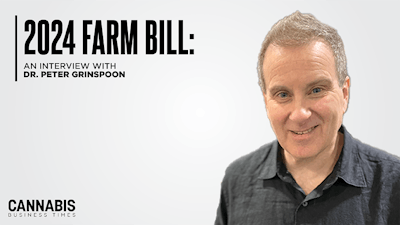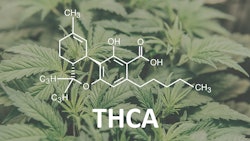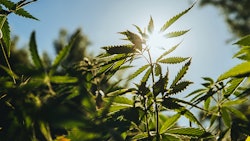
Hemp-derived intoxicating cannabinoids, such as delta-9 and delta-8 THC, took the U.S. and even global consumer marketplace by storm in recent years, through what is considered an unintended “loophole” in the 2018 Farm Bill. These intoxicating cannabinoids, which occur in relatively low levels in the hemp plant, can by synthesized from cannabinoids, such as cannabidiol (CBD), found in hemp, and therefore became federally legal alongside hemp.
Once the first intoxicating cannabinoids emerged, they immediately proliferated and are now sold virtually everywhere, from gas stations to liquor stores. The U.S. market for hemp-derived intoxicating cannabinoids increased 1,283% in just three years to become a multibillion-dollar market, according to cannabis data and analytics firm Brightfield Group.
With this proliferation came increasing concerns among legislators regarding availability of these intoxicating cannabinoid products to minors.
A national study published in the Journal of the American Medical Association (JAMA) in March found that more than one in 10 (11.4%) 12th-grade students reported delta-8 THC use. “Use prevalence was higher in the South and Midwest U.S. and in states without legal adult-use marijuana or Δ8-THC regulations,” according to the study.
Also of growing concern is general product safety arising from the lack of regulatory oversight that would include product testing for cannabinoid content, potency, pesticides, microbials and other harmful chemicals, bringing the subject into the limelight on both federal and state levels, legislatively. An amendment proposed by Rep. Mary Miller, R-Ill., to the draft 2024 Farm Bill would close the “loophole,” making the intoxicating hemp-derived cannabinoid market illegal. On a state level, a patchwork of varying approaches to regulations have emerged, from banning the cannabinoids altogether to restricting their use in food or beverage products to banning synthesized cannabinoids, and in rare instances, regulating them under the state cannabis program.
RELATED: Hemp-Derived Delta-9 THC: What’s Next?
Much of the cannabinoid hemp industry and consumers have been working to fight bans on these products. Most recently, in Florida, thousands of people are petitioning to urge Gov. Ron DeSantis to veto a bill passed in the state Congress that would make the sale of synthetic and intoxicating hemp-derived cannabinoids illegal in the state.
However, as long as these cannabinoids remain federally legal but unregulated, producers can sell their products online, across state lines.
All of this has created a counterbalance: A burgeoning industry that has created what some estimate as tens of thousands of jobs and provided consumer access to potentially medically beneficial cannabinoid products even in states where cannabis remains illegal vs. the desire to close an unintended loophole that has enabled widespread access to intoxicating, unregulated products in what has been referred to as a “public health crisis.”
RELATED: National Alcohol Group Urges Congress to Address Hemp’s ‘Public Health Crisis’ in Farm Bill
Other questions have arisen regarding the safety of these hemp-derived cannabinoids in and of themselves.
To shed some light on that question, as well as on questions of a path forward for a market where federal legislation created the current situation and is also poised to potentially revert to prohibitionary tactics that failed in the war against drugs, Cannabis Business Times turned to Peter Grinspoon, M.D., a primary care doctor at Massachusetts General Hospital, an instructor in Medicine at Harvard Medical School, a globally known cannabis expert and author of “Seeing Through the Smoke: A Cannabis Specialist Untangles the Truth about Marijuana,” published last year. Grinspoon has been treating people with cannabis for 25 years, ever since he became a doctor, and his experiences with cannabis go far beyond that.
He is the son of the late Dr. Lester Grinspoon, a psychiatrist and professor at Harvard Medical School, cannabis expert and advocate, and author of the book “Marihuana Reconsidered,” originally published in 1971.
“I grew up with all this stuff,” the younger Grinspoon said. “I couldn't have grown up with it any more than I did. There were people in my house pro legalization, talking about it.”
Grinspoon also had first-hand experience with cannabis’s medical benefits. “My brother Danny fought an unsuccessful battle with leukemia when I was a kid,” he said. “And my parents got him cannabis in the 1970s, and it really helped him. So, I actually went through medical school knowing that it could be a helpful medicine for people, sort of a different orientation than a lot of the other doctors. I was always very interested in it, always keeping up with the literature, and I have always treated people with it—it’s not for everybody, and it doesn't always work—but with really good success. And I've been doing that for about a quarter of a century.”
Grinspoon was also involved in the legalization movement, he said, “because criminalization is the worst-case scenario.”
Here is what Dr. Grinspoon had to say in this exclusive interview.
Noelle Skodzinski: What can you tell us about what is known about the safety of these hemp-derived intoxicating cannabinoids such as delta-8? Are you aware of any medical studies that have been done?
Peter Grinspoon: There were a few medical studies on delta-8, not many. One, I think in the ’70s, showed that it was helpful for kids with severe nausea from chemotherapy. Here and there there are studies, because remember, delta-8 and delta-10 are found in the cannabis plant, just not in high enough quality quantities to breed up or market.
The problem with the safety of them is twofold. One is: What's the intrinsic safety of the molecule? And the second one is: What's the safety in a scenario where it's completely unregulated?
Delta-8 and delta-10 are probably reasonably safe just because they’re so close to delta-9, and we know a lot of myths from the war on drugs about delta-9 that aren't true. We do know that it's not good to smoke. It can destabilize people with psychosis. We don't know if it's safe in pregnancy or breastfeeding. We don't think it's necessarily safe for teenagers. So, we know the harms of delta-9 pretty well. A lot of stuff needs to be further studied, like what is the effect on the heart? The data is so contradictory.
But delta-8 and delta-10 are probably going to end up—and I'm using the word “probably”—about as dangerous as delta-9 because it's one teeny little chemical bond apart. They're not that different. We don't know that for sure because they haven't really been studied.
And No. 2, as I mentioned, it's completely unregulated. You just don't know what you're getting—if you're getting delta-8 or delta-9, or some other weird synthetic cannabinoid, heavy metals, industrial byproducts—because there's literally no adult in the room monitoring or regulating this entire industry.
RELATED: Amazon’s CBD, Hemp and Delta-8 Problem
The other ones like HHC and THCP, those are even further from natural cannabinoids. We really don't know if they're safe or not safe or if they have potential medical benefits. They need to be studied.
It’s hard to study when it's completely unregulated.
Then you hear of all these 12th graders—as you said, one in 10—trying delta-8. A part of that is an access issue. You could just order it online.
But we don't know if delta-8 or HHC or any of these are safe in and of themselves, even for an adult. And it's more concerning the younger you are—hypothetically until age 25 when your brain stops developing. You don't want them to do cannabis or delta-8, but the devil you do know is sort of better than the devil you don't know.
And then the fact that nobody's regulating the access. To get cannabis, you have to go in to a dispensary. They check IDs, they're actually really strict, and teen use has been stable or has dropped since legalization. And they don't know if that's because it's just less cool with grandma smoking it on the sofa for her arthritis or if it's because a drug dealer will sell it to anybody, but in a dispensary, they're really uptight about who they sell it to, which is good.
So, again, they have access to these products, and we don't know what's in them, if they are safe or not. It's sort of like a vast uncontrolled experiment, for example, on these 12th graders. And I think it's really dangerous.
Skodzinski: What do you think is the solution?
Grinspoon: If we make them illegal, we're just going to make them all more dangerous because instead of being in the gray market, they're going to be in the illicit market. So, that's not necessarily a great option either.
The real solution is to regulate and to legalize, regulate and study, sort of like we're starting to do with cannabis.
That's the best thing you could do for all of us.
Skodzinski: That leads to my next question. What are your thoughts on the amendment that Representative Mary Miller put forth that was added the 2024 Farm bill draft?
Grinspoon: Well, I'm not familiar with the intricate details of the language, but I know what they're trying to accomplish. The 2018 Farm Bill was like a study in unintended consequences because it didn't mean to make all these intoxicating health products legal, and they didn't mean to create this multibillion-dollar industry of these completely unregulated products that are potentially poisoning people.
But at the same time, the cat's out of the bag. It's like whenever they try to clamp down on CBD, it doesn't really work because it's already like a $10-billion industry. One in three Americans have tried CBD. One in seven Americans are taking a CBD product.
Good luck clamping down on CBD.
People are still going to make these products, and they're still going to make a lot of money making them. And the further we criminalize and drive it underground—we've seen this time and time again with the war on drugs—the more dangerous these products are.
And furthermore, it's really interesting that the use of these synthetic products is higher in places where you don't have legal cannabis. So, if they’re going to criminalize these cannabinoids, they should be legalizing cannabis at the same time so that people will have less of an impetus to use these increasingly illegal and illicit market products.
Criminalization makes everything more dangerous. More harm comes from the criminalization than from these drugs themselves.
Skodzinski: What do you know about the potency of these cannabinoids? I’ve seen varying statements on that.
Grinspoon: Assuming you're actually taking delta-8—which is not in any way guaranteed as it could be literally anything if you ordered it online—delta-8 is supposed to be maybe a third to half as potent molecule for molecule, milligram per milligram, as delta-9 THC. And HHC is the same. It's like a third as potent, whereas THCP is three times stronger.
A lot of the problems we get into with cannabis is with dosing. We like to start low and go slow.
People go to a dispensary and the budtenders tell them, “Hey, try this 50-milligram beverage,” and they freak out and have an awful experience.
With products that are completely unregulated, you don't know what the potency is, and then with something like THCP, who needs a synthetic cannabinoid that's three times stronger than delta-9 THC and that's supposed to be the “psychedelic cannabinoid”?
That’s not what you want your 12th graders using. You don't want them using anything, but again, we don't know what it does to anybody's brain, let alone a 12th grader. All we know is that it affects the cannabinoid receptors, but it probably affects 20 other receptors. We don't know.
It’s a completely unprecedented and uncontrolled experiment with people's brains that are still developing. And I think it's really, really dangerous.
But again, I'm an advocate of regulation and education rather than criminalization. I don't think criminalization works at all.
Skodzinski: You mentioned that there have been a few studies over many decades on the medical benefits of delta-8 THC. What about the other semi-synthetic cannabinoids that seem to keep emerging?
Grinspoon: I did a piece for Harvard Health called “Beyond CBD: Here Come the Other Cannabinoids,” so I looked into the research for CBG, delta-8, THCV.
I would suspect there are probably a few studies on delta-10. But this is a very minor trace cannabinoid that wasn't very available until after the 2018 Farm Bill when people began readily producing it from CBD. So it's very recently popularized and marketed.
And furthermore, people are looking at harms of cannabis for most of the research. Now there's more balanced research than there was, but during the war on drugs for the last 50 years, to get any funding to study cannabis, you'd have to show a drop in IQ or sperm count or motivation or something, none of which is true.
There was not much impetus to study these other cannabinoids.
These cannabinoids have potential medical benefits, so we shouldn't just like lock them all away with this new prohibition. We really, really need to study them.
They're analogs of delta-9, which is really helpful, and of CBD, which is really helpful.
I think we need to study them and make the whole enterprise safer just with some regulation. This is weird that nobody's regulating them. Everybody’s complaining about the fact that nobody is regulating them, and the main legislative remedy that everybody's discussing is to ban them, which we know doesn't work at all for so many reasons that we've discussed.
Something needs to be done, but what needs to be done isn't what they're doing.
You'd think we'd learn from our mistakes with the war on drugs, but we don't always seem to be to be learning.
And it's just weird when we go from one extreme to the other—we legalize all of them, granted unintentionally in the 2018 Farm Bill, and then we try to criminalize them in the 2024 Farm Bill. It leaves a lot of people out in the cold—the people that are using them because they can't get regular cannabis for medical problems. They probably do help a lot of people.
I wish we'd be a little bit more sensible about our drug policy.



























